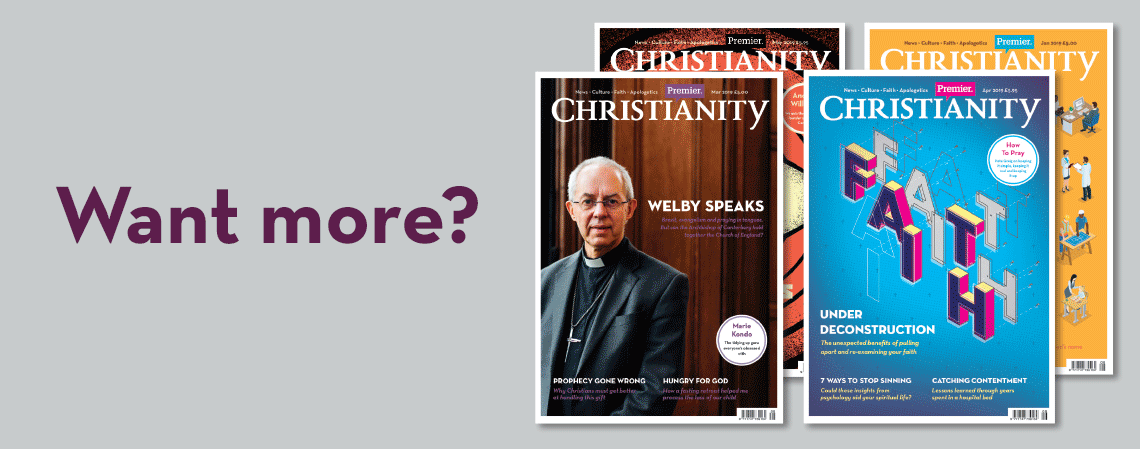
We live in uncertain times, but as Corrie ten Boom once wrote, we must “trust an unknown future to a known God”. As both a futurist and a minister, I’m especially conscious of the fact that only God can definitely predict the future. Yet we are blessed by God with the capacity to identify likely emerging trends, given current developments we see around us. We do this using a combination of curiosity, imagination, experience and a heart that recognises “the earth is the Lord’s” and he is vitally interested in every aspect of it (Psalm 24:1).
With that in mind, I’ve made a short but strategic visit to the year 2040. It’s my attempt to discover what opportunities and challenges the Church will face – and what type of Christianity will have the most influence. Here are six ways I believe the Church will change in the next two decades:
1. In two places at once
Welcome to 2040! The previous decade brought a revolution in church communications. Holographic projection has now largely replaced the use of video screens in services. Since the late 2010s, experiments in holography have allowed political candidates and entertainers to appear ‘live’ in more than one venue at a time.
In 2040, the power of this technology has improved as dramatically as its price has fallen. Speakers and worship leaders regularly appear in lifelike 3D, in events and churches spread across multiple cities, simultaneously. Holographics are also used to provide simulated interviews with key figures in Christian history. Computer networks can intuit from a deceased leader’s writings, speeches and actions how they might respond to particular current problems. Humanoid machines, some built to look like the character they represent, can respond to people’s questions in lifelike ways, in real time.
The Church in 2040 also benefits from sociable media. In the first 20 years of this century, the world changed with the introduction of old-school social media. Today, the two-dimensionality of social media has been given a 3D update. Sociable media uses digitally produced avatars to represent individuals in the online space. It then brings these lifelike avatars together in a virtual space, using advanced haptic (3D touch) tools that fool the human senses.
In 2040 even the cheapest virtual reality (VR) systems emulate all of our senses, including taste and smell. The entire experience has become more holistic and ‘real’ than anything our parents could have imagined in the early days of VR. Using this technology, evangelists speak to crowds gathered in virtual spaces and see real-life spiritual transformation among their listeners. Alpha-type courses are conducted across vast distances using the same technique – a huge boon for people living in remote areas.
Sociable media tools allow new opportunities for evangelism, too. However, people often benefit from training in how to use these technologies in a relational rather than ‘preachy’ way.
2. Supporting constant transition
In cities and local communities, automation has led to challenges with under-employment. Around 800 million jobs globally have been automated since 2020, not only in areas of skilled manual labour but in professions such as medicine, law, journalism and the arts. Some of the world’s elite symphony orchestras regularly play music composed entirely by machines – a practice first seen in the 2010s. More than a few hit plays have been written by computer networks.
New technologies have, of course, given rise to new types of jobs. It has been that way throughout history, but in 2040, even where there are new jobs, people struggle to transition quickly enough from one profession to another. Many middle-aged people have already changed their entire career several times.
Churches have taken up the challenge of providing transition training. Transition skills courses are taught to help people deal with the anxiety, apprehension and sense of loss often associated with career changes. These skills, along with strategic thinking and logic, are also taught in schools. Faith-based schools were among the first to introduce this type of teaching.
3. Globally missional, environmentally sensitive
Despite the introduction of fully electric and hybrid long-haul aircraft, people in 2040 are still concerned about global travel. Yet they retain their God-given curiosity and are hungry to see the world. As a result, a thriving virtual travel (VT) industry has emerged alongside the traditional tourism sector. For a small cost, people can experience foreign sites via haptic virtual reality and holography. VT has also proven popular with authorities that oversee sites of global significance. In Israel, for example, the government and private enterprise are keen investors in VT software. They market virtual trips to the Holy Land.
Many churches use virtual travel to engage in mission trips, especially those that provide schooling and micro-enterprise training. Meanwhile, the authorised use of autonomous bots, which can fulfil complex objectives without human input, makes it easier for charities to send emergency supplies to areas ravaged by war and natural disasters. Of course debates continue to rage about autonomous robots used in theatres of war. The evangelical and Pentecostal wings of the Church have had to become much more involved in complex ethical debates like these.
4. Cashless
In 2040, few people have any great use for cash. In many nations, over the past 15 years, coins have been largely abolished. Paper money, though it is still favoured by the elderly and anti-cashless activists, is accepted only in certain stores – and then simply because the law insists upon it.
The rush to abandon cash has brought with it a rise in personal debt. Studies reveal that people are spending more, but thinking less before doing so. For all its messiness, cash has weight, which means people can more readily identify when their supply is running out.
Some Christians have helped to pioneer small but vocal ‘return-to-cash’ movements. Their goals are to reduce the personal data garnered by digital cash systems; to offer alternatives to cashlessness for people who are reducing their online footprint; and to shrink the incidence of so-called ‘digital debt’.
Many churches have joined with local governments and businesses to offer regional currencies, based on exchangeable tokens.
5. Slow is the new cool
In a sharp departure from earlier cultural norms, people in 2040 largely look on fast-paced living as an anomaly. A one-time manic engagement with digital gadgets has given way to the pursuit of more relaxed and reflective lifestyles. High levels of automation at home and in the workplace have helped some people achieve a more meditative approach to daily life.
While ‘intelligent’ machines undertake mundane tasks, people have more time for idea-generation or just plain daydreaming. Skills to enhance the latter are taught to primary school children, to increase their capacity for contentment and innovation. Christian educators have been at the forefront of developing these courses.
Unfortunately not everyone has benefited from automation. Many churches run training programmes to reduce the rapidly widening technology gap, for people on low incomes.
In line with the push for more reflection, church services often feature unaccompanied vocal worship and scripture recitation. Some congregations offer multiple options in their services and ‘virtual service’ menus, with meditative sessions existing alongside a more high-energy variety. The meditative approach attracts thousands of young people who, while they consider themselves highly spiritual, are not keen to align with institutional religion.
Sociologists have noted a significant move away from some faith movements that are now considered excessively corporate in their organisation, or overly consumerist in their approach to spirituality. Meanwhile, people are seeking to express a bold yet thoughtful Christianity at all levels of their lives, not just in activities once thought to be especially spiritual.
While still promoting the centrality of prayer and Bible study, churches are sponsoring courses in the theology of social enterprise, entrepreneurship and design. The emphasis is on celebrating the Lordship of Christ in every aspect of life.
6. Generationally adept
In 2040, Generation Z is approaching middle age. It still retains its pragmatic, reforming zeal and has brought about significant changes in the worlds of politics, environmentalism, technology and economics. Members of this generation, however, are now watching nervously as a new group of young adults emerge into leadership. This cohort shows signs of being much more idealistic than Gen Z. In a throwback to their baby boomer forebears, they are not so much reform-minded as individualistic and inner-focused.
New religious awakenings have broken out among them in several nations simultaneously. For the most part, these movements have grown spontaneously and organically, without many recognised leaders. They are marked by a strong countercultural edge.
The church of 2040 is adjusting to the need to serve an increasingly older population base. Many church leaders now spend as much money on programmes for upper-middle-aged and elderly congregants as their predecessors did for the young. It is common now for churches to employ leaders with specialist training to work with this demographic. Many people in these age groups are leaving their home comforts to undertake long-term mission work abroad. Others are sensing a new call to setup social enterprises to solve societal problems in profitable ways.
Challenges and opportunities
In 2040, the world faces huge challenges and great opportunities. As Christians, we know our future will not be defined by the technologies we develop, but how we choose to use them. Our lives are in God’s hands. We must commit ourselves to plan as if Christ may not return for 100 years – for no one knows the day or the hour (Matthew 24:36) – but we will live as if he might return today!































